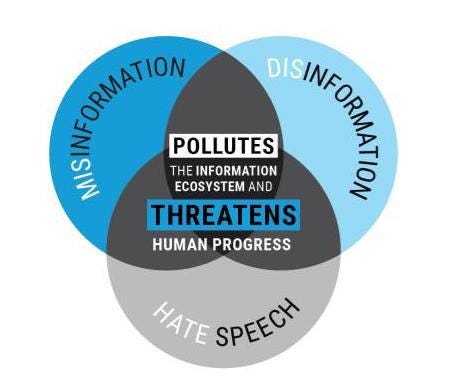Healing Our Troubled Information Ecosystem

Our information ecosystem is now so polluted with lies and hate that voices for positive change are seriously struggling to make themselves heard. In all my years in communications, I can’t say I ever worked in such a troubled environment.
And the stakes are growing higher by the day as breakneck developments in generative AI threaten to take online hate speech, mis- and disinformation to new levels.
Wildly popular new tools can generate distorted histories and fake profiles and present them — convincingly, persuasively — as fact. This is what happens when safety by design is ignored and the guardrails that prevent abuse are forgotten.
It wasn’t meant to be this way. When digital platforms first arrived, we communicators were so excited. For the UN, they held great potential to engage people directly with our advocacy and move them to act to improve the world.
And it’s true these tools have brought many benefits — revolutionizing communications for everyone, everywhere, connecting those crying out for change, bringing together the isolated, and reuniting the displaced.
But we’ve also seen a darker side. Digital platforms have enabled the massive proliferation of lies and hate on an industrial scale, enabling malicious actors to pump lies and hate into our public sphere, day in, day out, over many years.
We’ve all seen them: Snake oil salesmen persuading people to refuse life-saving vaccinations or cancer treatments. Fossil fuel magnates undermining climate action for profit. Malicious actors stirring up old fears and hatreds for nefarious and violent ends.
These voices aren’t new. But the global power of social media has meant lies and conspiracy theories can be instantly transmitted across the world, infecting millions of minds, eroding trust in science, and seeding hatred potent enough to spark bloodshed.
The impacts are devastating. In conflict settings, where information is weaponized to feed the worst of human nature, lies spread on social media have helped genocidal governments convince ordinary people to murder, rape, or drive out fellow citizens.
This has happened against a wider backdrop of rising online hate. Across the board, algorithms that prioritize engagement above all else have driven polarizing views into the mainstream, normalizing antisemitism, racism, and other hate speech in the process.
Spare a thought in all this for those whose daily task it is to provide trustworthy information to the public so they can make decisions based on the facts. In this polluted landscape it is getting harder and harder for these voices to make themselves heard.
That’s true not only for journalists and communicators working in the public interest. All those pushing for positive change are finding it harder to operate online — from climate activists to peace advocates, to those trying to eradicate childhood diseases.
Existing responses have broadly been lacking. Some platforms have done too little, too late to prevent the spread of violence and hate, while some states resorted to drastic blanket internet shutdowns and bans that lack legal basis and infringe on human rights.
UN Secretary-General Antonio Guterres has long called for a response to address the grave global harm caused by the proliferation of hate and lies in the digital space, while vigorously safeguarding the rights to freedom of expression and information.
The UN is working on multiple fronts towards this goal — stepping up our online communications to elevate facts and science and working with the platforms to reduce the spread of hate, incitement to violence, and false science.
But now the time has come to massively ramp up our response and tackle this crisis as a global priority.
This week we introduced a first step of a new concerted global effort to work towards a healthier information ecosystem, one that puts human rights front and center of the response.
Just published, the Secretary-General’s policy brief sets out the UN’s perspective on these complex issues, the challenges we face and the changes we want to see, drawing on expertise from range of lawmakers, tech innovators, academics, and factcheckers.
These proposals will be built on in an upcoming UN Code of Conduct for Integrity on Digital Platforms to set global standards for a more humane internet and seek ways to promote independent media and the work of journalists.

Our response comes amid a wider ramping up of efforts to build more integrity into our digital world. Conversations in recent weeks, from the Nobel Summit in Washington to meetings in Nairobi, have shown me the world is now sitting up and taking notice.
Universities and think tanks across the world are dedicating more resources and researchers and establishing institutes and new fields of study to find the solutions and help work towards building a more humane online sphere that elevates facts, not lies.
That’s as growing numbers of people are imagining a world in which digital platforms deliver on their early promises as inclusive spaces for exchange that safeguard the human rights of all — including the marginalized.
So, as the UN takes this next step, I’m excited to continue these fascinating discussions. Together, I know the efforts of those bringing much-needed healing to our troubled information ecosystem outweigh those intent on polluting it with lies, fear, and hate.
